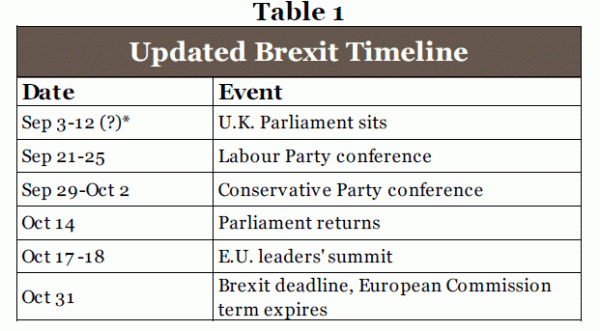Executive Summary
Today’s move from U.K. PM Boris Johnson raises the already-high stakes for U.K. Parliament next week. A no-confidence motion in Johnson’s government is a distinct possibility, but may not succeed, and other efforts to block “no-deal” next week may be futile. We now see a higher chance of a no-deal Brexit (40%) but also a slightly higher chance of the “deal” outcome (45%).
Welcome Back, My Friends!
U.K. PM Johnson took steps today to prevent Parliament from sitting between mid-September and October 14, limiting the amount of time available for members of Parliament (MPs) to work to block a no-deal Brexit. Parliament was already scheduled to be on recess for the bulk of that time for the various party conferences, and thus Johnson’s move reduces by only a few days the amount of sitting time for Parliament between now and October 31 (Table 1). Still, it makes an already-tight timetable for MPs to block a no-deal Brexit even tighter, and Parliament’s best hope to stop “no deal” before late October may be a motion of no-confidence against Johnson’s government next week. Labour leader Jeremy Corbyn has already threatened a motion of no-confidence, but may not bring it forward unless he thinks it can pass. In any case, expect next week to be an especially contentious one for U.K. Parliament. The boundaries of parliamentary procedure are likely to be tested
Today’s move from Johnson raises the chances of a no-deal Brexit (now 40%, in our view). MPs opposed to ‘no-deal’ now have less time to work to stop it. However, we now also see a slightly higher chance of a ‘deal’ outcome (45%, in our view), in which the U.K. leaves the E.U. with a deal. Johnson’s move to suspend Parliament effectively resets the legislative agenda, allowing another vote on the Withdrawal Agreement (WA). The Irish border backstop remains too contentious for the deal in its current form to be approved by U.K. Parliament, but the question is whether the E.U. will be willing to grant concessions on the backstop. We remain skeptical, but offering concessions may be preferable to a no-deal Brexit. Of course, the ball is not entirely in the E.U.’s court—the U.K. could still take dramatic steps at the last minute to avert a no-deal Brexit, including another vote of no-confidence in the government or ratifying the WA in its current form. In any case, we now see a higher probability of both ‘deal’ and ‘no deal,’ as shown in our updated probabilities below:
- ‘Deal’ – 45% (40% previously)
- ‘No deal’ – 40% (30% previously)
- ‘No Brexit’ – 15% (30% previously)

